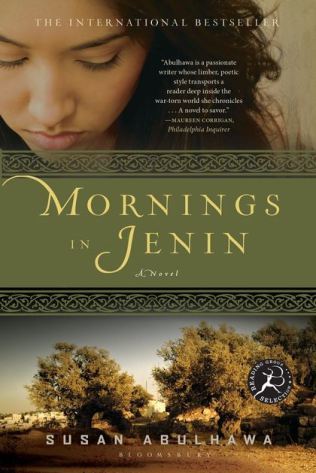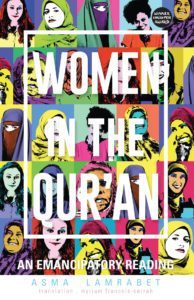Shereen Malherbe's Blog, page 21
May 13, 2017
Preview Jasmine Falling via Goodreads
Dear Readers,
Jasmine Falling is now available to preview for free on Goodreads. Join the other 752 people in the community talking about it.
I am also now answering questions posted by the Goodreads community ahead of my first book tour.
Looking forward to engaging with you.
Shereen Malherbe


April 30, 2017
A review of Asma Lamrabet’s “Women in the Qu’ran” via MMW

One of the rare books I didn’t read in French first (and as such cannot vouch for the translation), Asma Lamrabet’s Women in the Qu’ran: An Emancipatory Reading is a short (just under 170 pages) and uplifting read. The book is definitely an interesting contribution to scholarship on women in Islam, and i found it quite digestible and enjoyable.
I have neither the scholarship in Islam nor the mastery of language to offer any in-depth criticism of Ms. Lamrabet’s exegesis or analysis, and I don’t think this review should be about that anyway. The tone of the book is such that it can be read by a broad audience (so kudos to the translator for that), and the length of the book is such that I don’t think it is meant to be a definitive work on anything; rather, this book is a starting point for discussion(s). So if you are looking for me to confirm or deny her explanations of the Qu’ran, I am not going to do that, because it is not my place and not really the goal of this review
So as a simple casual reader and a (Muslim) woman, I was already drawn in by the introduction, Especially given that this book was first published in French (and would presumably be read by a French/Francophone audience), I loved how the tone was set right in the introduction: Ms. Lamrabet talks about the status of women in Islam, making a distinction between interpretations coming from a “rigid, conservative Islamic approach” and a “Western, Islamophobic and ethnocentric approach.” Yes please.
Then there was a sly clap back aimed at the media and their darlings who talk about/for Muslim women, where she points out (page 6),
“it is sad to note that Muslim women who are rebelling against the alleged ‘diktats’ of the religion are those the most heard and given the greatest amount of airtime…this is not surprising in and of itself, since the only acceptable or even expected critique in Western circles today is that which challenges the Islamic tradition.”
Tell me more, Ms. Lamrabet, tell me more.
The introductory chapter, “In the Beginning” tells the story of Adam and Eve, with the author pointing out that the language of the Adam and Eve story is not gendered and states on page 12 that there is “ no qu’ranic affirmation which specifies that the Adam of this initial creation was male and even less that Eve was drawn from one of his ribs!” This is a change from the more historically accepted accounts of Eve being created from Adam’s rib, for example.
After the introduction, the book is divided into two large sections: “When the Qu’ran Speaks of Women” and “When the Qu’ran Speaks to Women.” These sections are then divided into smaller sections telling stories of or about women in the Qu’ran.
Section One is divided out into stories of Balqis (the Queen of Sheba), Sarah and Hagar, Umm Musa and Asiah, and Maryam. Of these, I especially loved Ms. Lamrabet’s analysis of Balqis. How did we get from having a powerful female leader like Balqis thousands of years ago to women being denied even political participation today? On page 28, Ms. Lamrabet notes,
“The description which the Qur’an makes of this woman head of state is in and of itself an undeniable refutation of all the allegations of the hyper-emotionalism of women who are said to reason less well than men due to the hyperemotivity of their personality and who, according to the same logic, cannot lead, politically speaking, an entire people!”
In Section Two, Ms. Lamrabet goes through occasions in the Qu’ran which involve: “Responding to feminist demands”, “Encouraging women’s social preparation”, “Female political refugees”, “The political participation of women” and “When God listens to the secrets of a woman.” Of these I enjoyed a point made in the section regarding women’s social participation (page 105):
“Islamic history is replete with stories which illustrate the Muslim community at the time of the Prophet was a community of men and women and that they worked together side by side for the good of all, without losing themselves in secondary considerations.”
She develops this in the next paragraph:
“How have we arrived today at the point of developing impulses for separation between the sexes in all social congregations, in the name of Islam, and imagining extraordinary strategies to separate feminine and masculine spaces with the objective of proving that the social act in itself is very Islamic? We obsessively hold to appearances when what should actually be Islamic is our behavior towards one another.”
Preach. I have a major problem with gender norms being used to control or stop women’s behavior, as if we are the ones who need to be behaving “more.” How can we reconcile platitudes about Muslim women being given their rights with these same men using so-called Islamic tradition to shut us down by not even allowing us to sit at the table?
The conclusion left me with something else along the same lines to think about that really stood out (page 161): “How could the earliest Muslim women have acceded to these spaces of freedom, of knowledge and power, fourteen centuries ago when today they are forbidden access to these same spaces in the name of this same Islam?” This is something I have wondered about in the past, often times upon hearing the stories of Aisha and Khadija. Aisha had an obvious place amongst men which modern Muslim women do not always enjoy. I felt this again reading the story of Balqis in the first half of the book. If these are our female Muslim role models, then why are we being told today not to occupy the very spaces they did and that wanting that kind of role for ourselves is in itself unIslamic? Surely there is a middle ground between rejecting orthodoxy and rejecting Islam in order to reclaim our place.
In closing, I liked this book and thought it was a fun, thought-provoking read. If you are a woman, like me, who is tired of people coming up with the whole “Islam gave women all their rights” argument (which Ms. Lamrabet addresses at several points throughout the book) to shut things down when practice says otherwise, this book will cheer you up. Some criticisms exist of Ms. Lambrabet either avoiding or glossing over problematic topics in the Islamic tradition (like polygamy, although I think she has been reasonably clear on that topic in a number of sources), or of her methodology being weak. As such, people looking for drier or deeper subject matter may be disappointed, but as I mentioned above, I don’t think the endgame of this book is to change the world but rather to start a discussion on the place of women in our religion beyond platitudes of “Islam gave women their rights, what more can you ask for?” And Women in the Qu’ran is a good place to start that discussion.
A copy of this book was graciously provided by Kube Publishing for consideration.


April 29, 2017
The Story Of Maha – A book review
I read the Story of Maha and was particularly interested in the insight of a Muslim girl growing up in South Africa. The book immerses you into this world completely as you follow Maha’s life.
Maha is a strong, feisty character, from a fairly well off background which affords her certain privileges that others don’t have. Although the teen angst comes through despite this ease. Woven into her life are cultural and family problems, as with every teenager which makes the story realistic and builds an emotional picture of her and her journey.
The only criticism I have is that the story begins with her backstory which makes it slightly harder to get into initially. Also, this may not be suitable for all audiences due to the references to sexual episodes and exploration.
Recommended for those who want to have a no-holds barred peek into one girls journey being raised Muslim by Indian grandparents in South Africa.
I am looking forward to reading more from Sumayya Lee.
For more information on The Story of Maha, visit Goodreads.


Returning to Palestine: Youth are our future
I haven’t managed to return to Palestine for years. When I visited Palestine, I went as a traveller, someone passing by this land. I have links to the country through my heritage but this isn’t the same as those who are born there. My relationship with the country will always be from a different viewpoint. It was with this viewpoint that I wrote my debut novel, Jasmine Falling, based in the Occupied Territories of Palestine and Jerusalem.
My personal drive to write this was because of a necessity to capture the eroding history of a country I belong too. It was also a need to share this with the world who may never have the opportunity to see it as I did, or as it existed then at that moment. In a tumultuous country under Occupation, history and the landscape are erased at a quicker pace. Yet, I see hope for the future. A hope that must come from our youth. The return of my book to Palestine is important to me because I want students to have the opportunity to read it for free. My book has been delivered to all the major universities in Palestine and arrived at Birzeit University this week. It is with this in mind, that I begin to plan my first book tour, in Palestine and to visit universities as part of the tour.
My return to Palestine will be one that is a celebration and a way of giving something back to those who inspired me to spend four years extracting shared stories from a land rich with ancient history and yet an uplifting strength and faith which still inspires how I live today.
There is no where else in the world that will be as appropriate as returning to the land that inspired it, than sharing the book and allowing others the opportunity to discuss it. This comes with trepidation as well as excitement. For returning with stories that I have made my own, yet those that are shared with Palestinian’s in a land of so much hope, courage, strength and turmoil, will always be a difficult one. But this is an integral part of the journey. This is where it belongs.


March 23, 2017
Another Update! & Vote
Check out these inspiring student women leaders making a difference
So I’ve mostly been away from blogging due to my second-year retakes which I couldn’t balance with blogging and extra-curricular activities. In sha Allah, it should be done in two months so please do keep me in your prayers.
In the meantime, I have been very fortunate to have been nominated in the Tab’s ‘London Students Women to Watch in 2017’ list and I need your help! I would really appreciate you voting for me and my LSE sisters through the link below and sharing with your friends and followers if possible. Thank you!

Love,
MuslimGirlJournal


March 3, 2017
Book Review: Mornings in Jenin by Susan Abulhawa

Synopsis from goodreads.com Mornings in Jenin
My thoughts
To say Mornings in Jenin wrecked me is an understatement. I’m not really sure how to share my thoughts on this book. It was so heartbreaking I shed a few tears. Tears that, although fiction (names and love stories, etc..), these events actually happened, that there are real people who lived this tragedy, that majority of the world is so unaffected by the Israeli- Palestinian conflict. That we sit in our safe homes and simply pick a side in the conflict without knowing the full details. I’m completely wrecked that human beings are capable of such wickedness and can inflict so much pain on another.
The writing was so vivid that I could easily picture it all. The author also leaves you with wanting to research and learn and not just take what we see in media as the truth.
What made…
View original post 183 more words


February 27, 2017
How to Write Flash Fiction

WHAT IS FLASH FICTION?
Flash fiction is a short-short story told in 2000 words or less. It is my current area of interest because I’m wanting to enter a few pieces in a flash fiction contest, the one I blogged about last week.
So here I sit asking myself where to begin, and my best bet is to learn a few things about what goes into writing a great piece of flash fiction.
At first thought, writer’s who are unfamiliar with these short shorts might think it seems like a fairly easy task to undertake. But considering the limited amount of space that you have to get your story to work its magic, I’m assuming it might actually be a bit more difficult than expected.
Creating just the right setting, only the necessary dialogue – in fact, the perfect dialogue, creating an atmosphere that begs to be explored further, all…
View original post 294 more words


February 14, 2017
THE STRANGER ON THE BUS RESTORED MY FAITH IN HUMANITY!
The bus was empty so I decided to sit on the lower deck, at the front, there was only one other passenger on the bus who sat in front of me, a few minutes went by and I noticed that she kept turning back and looking at me. Every time I smiled, she would quickly look away, as funny as it seems she was not very good at disguising it. I didn’t mind the starting it was normal I know some people do it out of curiosity, because they feel sorry for me and others do it out of ignorance, but whatever the reason it didn’t bother me. The glances kept exchanging back and forth throughout the entire journey.
Until we came to a stop where she picked up her bag and stoop up, to my surprise she turned facing towards me and slipped a folded note into my hands…
View original post 844 more words


February 6, 2017
Writing between two worlds
Writing between two worlds
Published in Sister-Hood Magazine
27th September 2016 |by Shereen Malherbe |@MalherbeGirl|Share this article:
I often reminisce about sun-drenched afternoons in Palestine when we had the time to sit and share stories. We would walk home at dusk. Our conversations became about hope and expectations as we tried to find our own place in the world. The worries of the Occupation would temporarily fade into the background to be replaced with life and its opportunities, despite the many restrictions. This however, was not my childhood. I was born and raised in England, with minimal contact with my Palestinian family except for the odd trip there as a child. The joining of our two worlds, which happened on that afternoon in my twenties, and has led me on the start of my own journey.
During those months spent in Palestine, I began collecting stories, those…
View original post 570 more words


December 27, 2016
Why Are Men Speaking for Muslim Women in Literature?
What is your favorite book? You might be like me and have too many to mention. Of those books, which characters are your favorite? Do they represent you?
The answer to this, in the majority of western published literature is probably no. If you are represented, have another look at the author — is the author part of your demographic?
As one example, I think of Khaled Hosseini and his bestseller, “A Thousand Splendid Suns.” His book centers around two Muslim women and is written by a man.
Should that matter? I think it does.
We need to consider why men are allowed to speak for us. This is not a critique of Hosseini — it is a critique about how others seem to be filling in the literary gaps to narrate our stories. There are increasing opportunities to be heard through various online platforms that capture our…
View original post 598 more words











